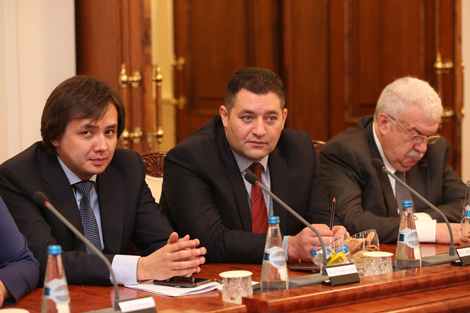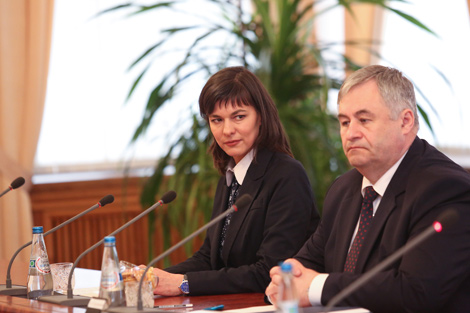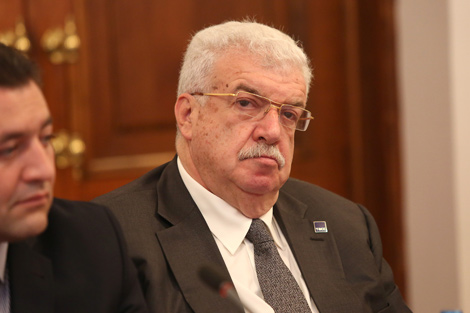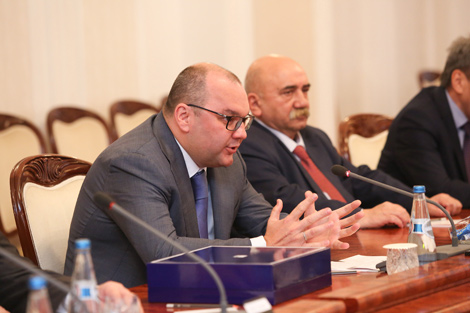Opinions & Interviews
Belarus prime minister speaks up for equal responsibility for all mass media

MINSK, 19 April (BelTA) – All kinds of mass media should bear equal responsibility for the information they distribute. Prime Minister of Belarus Andrei Kobyakov made the statement as he met with the CIS Mass Media Heads Council in Minsk on 19 April, BelTA has learned.
 The Belarusian parliament passed the first reading to amendments to the Mass Media Law on 19 April. Andrei Kobyakov pointed out that the planned amendments are not designed to create some filters for Internet content. “At the same time the key task is to make sure that all kinds of mass media — printed media, television, and Internet media — bear equal responsibility for the information they distribute,” stressed the Belarusian head of government.
The Belarusian parliament passed the first reading to amendments to the Mass Media Law on 19 April. Andrei Kobyakov pointed out that the planned amendments are not designed to create some filters for Internet content. “At the same time the key task is to make sure that all kinds of mass media — printed media, television, and Internet media — bear equal responsibility for the information they distribute,” stressed the Belarusian head of government.
The prime minister remarked that trust in information comes to the forefront these days. “Reliable and up-to-date information is one of the most important needs for mankind. One can hardly imagine the civilized world can exist without it. This is why the matter of reliability and prompt news delivery is extremely important. It is what news agencies are all about,” said Andrei Kobyakov.
 Andrei Kobyakov compared the distribution of negative news by mass media to weapons of mass destruction. Today's technologies for delivering news and their universal adoption only make the influence of mass media stronger.
Andrei Kobyakov compared the distribution of negative news by mass media to weapons of mass destruction. Today's technologies for delivering news and their universal adoption only make the influence of mass media stronger.
Even the economy is affected by it. “Information influences not only the state of peace and war — although it is the key matter for the humankind — but also economy and markets of developed nations and developing ones. Trust is one of the most important categories people have been frequently talking about of late. Trust is shaped by the impact of information. If depositors don’t trust banks, if investors don’t trust governments, then the economy in such countries will be far from reaching its goals,” said the prime minister.
 Andrei Kobyakov thanked the heads of news agencies from the CIS member states for their praise of BelTA’s work. “We appreciate your evaluation of BelTA’s performance. This year the agency will celebrate its 100th anniversary as an up-to-date and rather mobile institution, which lives up to challenges of the time,” said the prime minister.
Andrei Kobyakov thanked the heads of news agencies from the CIS member states for their praise of BelTA’s work. “We appreciate your evaluation of BelTA’s performance. This year the agency will celebrate its 100th anniversary as an up-to-date and rather mobile institution, which lives up to challenges of the time,” said the prime minister.
Sergei Mikhailov, Director General of the Russian news agency TASS, said that during the session of the CIS Mass Media Heads Council on 19 April they discussed creative interaction between state-run news agencies, which have to operate in the face of tough competition with other kinds of mass media and the Internet. The TASS director general noted that the Internet is home to quite a great deal of fake news. Such news spread rather fast. News agencies have to stay competitive in these conditions by separating the wheat from the chaff.
 “The precision of information — which sources we can trust and which we can’t — comes to the forefront,” believes Sergei Mikhailov. “We are convinced that professionalism, timely delivery, authenticity, and precision in reflecting points of view are crucial to the success of our news agencies. It is important for us to draw attention not to confrontation, not to abusive rhetoric often spread by various mass media, but to the coverage of positive events in the life of our countries, integration processes, and friendly ties between nations.”
“The precision of information — which sources we can trust and which we can’t — comes to the forefront,” believes Sergei Mikhailov. “We are convinced that professionalism, timely delivery, authenticity, and precision in reflecting points of view are crucial to the success of our news agencies. It is important for us to draw attention not to confrontation, not to abusive rhetoric often spread by various mass media, but to the coverage of positive events in the life of our countries, integration processes, and friendly ties between nations.”
The CIS Mass Media Heads Council (CIS Information Council) was established in November 1995. Its members are the heads of state-run news agencies of Azerbaijan (AzerTAc), Armenia (Armenpress), Belarus (BelTA), Kazakhstan (Kazinform), Kyrgyzstan (Kabar), Moldova (Moldpress), Russia (TASS), and Tajikistan (Khovar).







 print version
print version make home page
make home page add to bookmarks
add to bookmarks

